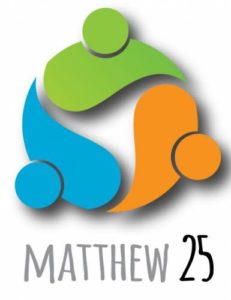This study interweaves the histories of FPC and Greensboro with a lens toward racial justice. It begins at the founding of FPC and ends by envisioning what is possible for our future. We celebrate the points in time that our community did the right thing, but we spend most of our sessions in lament and confession for our missteps and where we have strayed from the gospel of Jesus Christ.
FORMAT: A video presentation is posted along with discussion questions and homework, as well as weekly pilgrimage sites and/or prayer walks and resources and readings.
WEEK ONE: Why Are We Here?
Senior Pastor Jill Duffield and Rev. Keith Dove introduce the study with this video.
DISCUSSION QUESTIONS
-
- People often argue that the church is “getting too political” when it gets involved in anti-racist work. How is our work actually rooted in our faith?
- After reading Matthew 25, where can we find Christ in our community? As Presbyterians, we “stand where the Lord stands.” Where is the Lord standing?
- What makes the church unique in its ability to address racism? What can we rely upon? What sustains this work?
- The Confession of 1967 was written to understand how God was at work in a particular time and place. How is God at work here and now?
HOMEWORK
-
- Read Matthew 25 and the Confession of 1967.
- Watch these videos from the Matthew 25 vision of the PCUSA:
- What is Matthew 25
- Eradicating systemic poverty
- Dismantling structural racism
- Building congregational vitality
- Matthew 25 worship service with Rev. Dr. J. Herbert Nelson and Rev. Dr. Diane Givens Moffett
- Project Implicit – Take A Test – Harvard University
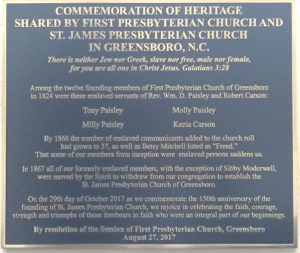 WEEK TWO: Beginnings
WEEK TWO: Beginnings
Rev. Keith Dove and Catherine Johns discuss the early history of Greensboro and the founding of FPC by William Paisley in this week’s video. We will lament and confess that our founding is entangled with the sin of slavery, as four of our twelve founding members were enslaved by either Rev. Paisley or other members of the congregation. We will explore the relationship between Greensboro Presbyterians and Quakers (who were abolitionists).
DISCUSSION QUESTIONS
-
- The sin of slavery was part of FPC’s beginning and founding. How does that affect what we do today? What responsibilities do we have in light of our history?
- We often use the argument that people were “products of their time” to excuse the faults of our predecessors. However, both slave owners and abolitionists were equally products of their time, and there were known abolitionists in the Greensboro area at the time of FPC’s founding. What do we make of this? What does that do to the “product of their time” argument?
- Confession is a hallmark of our faith, but people are often wary of confessing the sins of the past. Should we confess the sins of those who came before us? Are we accountable for their sin?
- How are you feeling in response to learning this information about our history?
HOMEWORK
-
- Watch “Another Such Victory” video from the Guilford Courthouse National Military Park.
- Read this text from the plaque in the Tower Room:
FPC COMMEMORATION OF HERITAGE SHARED BY FIRST PRESBYTERIAN CHURCH AND ST. JAMES PRESBYTERIAN CHURCH IN GREENSBORO, N.C. There is neither Jew nor Greek, slave nor free, male nor female, for you are all one in Christ Jesus. Galatians 3:28 Among the twelve founding members of First Presbyterian Church of Greensboro in 1824 were these enslaved servants of Rev. Wm. D. Paisley and Robert Carson: Tony Paisley, Molly Paisley, Milly Paisley, Kezia Carson. By 1866 the number of enslaved communicants added to the church roll had grown to 37, as well as Betsy Mitchell listed as “Freed.” That some of our members from inception were enslaved persons saddens us. In 1867 all of our formerly enslaved members, with the exception of Sibby Moderwell, were moved by the Spirit to withdraw from our congregation to establish the St. James Presbyterian Church of Greensboro. On the 29th day of October 2017 as we commemorate the 150th anniversary of the founding of St. James Presbyterian Church, we rejoice in celebrating the faith, courage, strength and triumphs of those forebears in faith who were an integral part of our beginnings. By resolution of the Session of First Presbyterian Church, Greensboro, August 27, 2017.
-
- Review the Guilford County slave deeds project.
- Review the UNCG People Not Property slave deeds page.
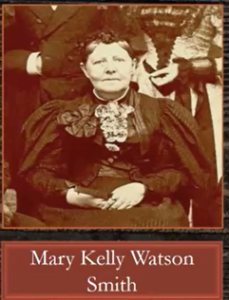 WEEK THREE: Civil War and Reconstruction
WEEK THREE: Civil War and Reconstruction
Explore the split between the northern and southern Presbyterian churches over slavery (the split remained until 1983) and look at the role of FPC in the Civil War with excerpts from the diary of Mary Smith, wife of then-pastor Jacob Henry Smith. We will lament that FPC was not a safe place for newly freed slaves to worship and confess our failure to live into the kingdom of God during Reconstruction. Led by members Catherine Johns and Betty K Phipps, with Spiritual Formation Director Donna Chase. Video here.
DISCUSSION QUESTIONS
-
- We celebrate the faithful ministry, service and legacy of the Smith family to FPC and Greensboro and yet like the Paisleys, the Smiths owned slaves. How do we understand this part of our church’s pastoral leadership in terms of the sin of slavery? How do you think this may have impacted the church at the time and us now?
- How did Catherine’s explanation of the difference in 18th and 19th century slavery in NC impact your thinking? How might viewing another as less than justify the idea of owning another human being as property?
- The lynching of Eugene Hairston in Guilford County is part of a Remembrance project in Greensboro. Why is it important to remember these horrible acts of violence and injustice in our city and state?
- FPC committed to the Civil war effort by turning its large church space into a makeshift hospital for wounded Confederate soldiers. The church also melted its bell into bullets for the cause and Rev. Smith served as a Confederate chaplain ministering to the wounded, dying and their families. What may have been the positive and negative consequences in the community of these actions by the church?
HOMEWORK
-
- Watch Remembering a Lynching, a webinar on YouTube.
- Read “Group in Guilford County seeks to memorialize 1887 lynching of black teenager.”
- Read FPC History, Civil War period and Smith Family and the Smith Family Archives from the Greensboro History Museum.
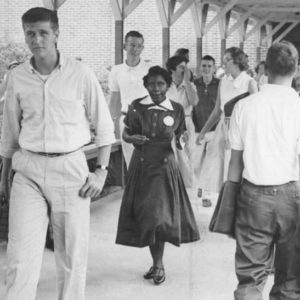 WEEK FOUR: Jim Crow and Civil Rights
WEEK FOUR: Jim Crow and Civil Rights
The history of Jim Crow, both at large and in Greensboro, lamenting lynchings which would regularly occur after Sunday worship services across the South. FPC’s responses to Brown v. Board of Education and the Sit-In Movement. Led by member Mary Eagle with Rev. Keith Dove and Donna Chase. Video here.
DISCUSSION QUESTIONS
-
- During the Civil Rights Movement, FPC was known for having great potential, but remaining silent and avoiding conflict. Why do you think that was the case? Do we see any of those tendencies today?
- Martin Luther King, Jr., wrote that the greatest stumbling block to the Civil Rights Movement was the white moderate. Why was this true? Is it still true?
- Why is it important to confront the atrocities of the past, such as lynching? How can we ensure that such things never happen again?
- The Greensboro Sit-in was not the first sit-in, but why was it the first to spark a larger youth-led movement throughout the south?
- As Presbyterians, we are reformed and always reforming. How can we find hope in the changes of conviction that occurred at FPC? Where do we see need for change today?
HOMEWORK
-
- Read Belles of Liberty: Gender, Bennett College And The Civil Rights Movement by Dr. Linda Brown. Listen to Dr. Brown’s interview from CCL Book Club.
- Read Greensboro News & Record article on Rev. Dr. Redhead and and MLK’s Letter from a Birmingham Jail.
- Read these sermons from Dr. Redhead: The Crisis in the Nation (1968) and Your Church and Racial Brotherhood (1956) and from Rev. Dr. Mullin: One Nation Under God (1971).
- Visit: NC A&T State University’s The Famous 4 Statue, Bennett College’s Pfeiffer Chapel, and The Historic Magnolia House.
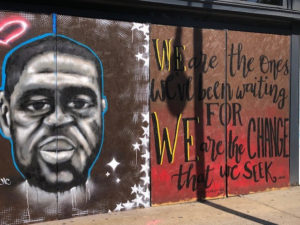 WEEK FIVE: The Greensboro Massacre, Black Lives Matter, and the Future
WEEK FIVE: The Greensboro Massacre, Black Lives Matter, and the Future
The Greensboro Massacre and the controversy it holds in the community today; the BLM movement and the continuation of police brutality here and across the nation; street art of the summer of 2020 after the deaths of George Floyd, Breonna Taylor, and Ahmaud Arbery; and our Service of Reconciliation with Saint James Presbyterian in 2020. Led by members Victoria Alexander, Catherine Johns, and Margaret Arbuckle with Donna Chase. Video here.
DISCUSSION QUESTIONS
-
- Nelson Johnson mentions that one of the most important things we can learn to do in conflict is to “see the humanity in the other”. How do we practice this as part of our faith? What are ways we see the humanity in others in our advocacy work?
- The 1985 civil suit was the first time ever in our nation’s history the KKK and Nazi Party, the Greensboro Police Department, the FBI, and the U.S. Bureau of Alcohol, Tobacco, and Firearms were found liable for providing firearms and failing to act on prior knowledge they had about violent attacks planned by the Klan and the American Nazi Party, as well as information provided by a GPD and FBI informant. The Greensboro City Council took 41 years to apologize for the role city police and other city personnel played in failing to act on prior knowledge. How does this differ from what we’ve discussed about the Wilmington massacre? How does this reflect previous discussions we’ve had in this course about the importance of admitting when a wrong occurs, no matter how long it’s been?
- How do you feel after listening to Gina Franco describe her experience during the Black Lives Matter protest movement of 2020? What do you remember about the protest movement throughout much of the summer last year? How have you seen this work continue into this year?
- What connections do you see within our community between the Greensboro Massacre, the formation of the Truth and Reconciliation Committee, and the Black Lives Matter protest movement during 2020? What are ways our community and our church have grown? Where do we still see areas we need to work on?
HOMEWORK
-
- Take a virtual tour of the Pieces of Now exhibit the Greensboro History Museum has put together.
- Readings:
- Death to the Klan march
- Article on PCUSA Stated Clerk Rev. Dr. J. Herbert Nelson’s sermon at the interfaith service held to commemorate the 40thanniversary of the Greensboro Massacre
- Greensboro, NC issues historic apology for police complicity in 1979 massacre
- The Massacre That Spawned the Alt-Right
- Greensboro Truth and Reconciliation Commission
- Marcus Smith and City Council resolution
- Pilgrimage: Greensboro Massacre Commemorative Plaque, Pieces of Now Exhibit at Greensboro History Museum (in-person with COVID guidelines or virtually)
WEEK SIX: A Future of Racial Justice
As the series concludes, imagine a future of racial justice for our congregation, our town, our state, our nation, and our world, and actions we at FPC can take to work toward that vision. Led by members Mary Eagle, Catherine Johns, Victoria Alexander, and Margaret Arbuckle with staff members Rev. Keith Dove and Donna Chase. Video here. Referenced in the video: Wangari Maathai and the Green Belt Movement.
DISCUSSION QUESTIONS
-
- How has using the lens of Matthew 25 changed the way you look at the world around you? Or how is it beginning to change?
- In our group agreements, we make a distinction between intent and impact. One of the most common things that well-meaning people say is “I don’t see color.” How do the intent and impact differ when we say this? How can we move to celebrating diversity, rather than ignoring it?
- This class has mainly focused on racism against Black people. How can we move from having this singular focus to a lens of intersectionality? How does this class intersect with other topics or missions?
- What’s next? Where do we go from here?
HOMEWORK
-
- Readings:
- The Liturgy from the Service of Reconciliation with St. James Presbyterian Church
- The Liturgy from the Service of Repentance and Lament
- Matt Logan’s Lent devotion “When in Fisher Park”
- Readings:
CONVERSATION ON ZOOM
-
- Wednesday, May 26, at noon
- Contact Yolanda Baxter for link.
